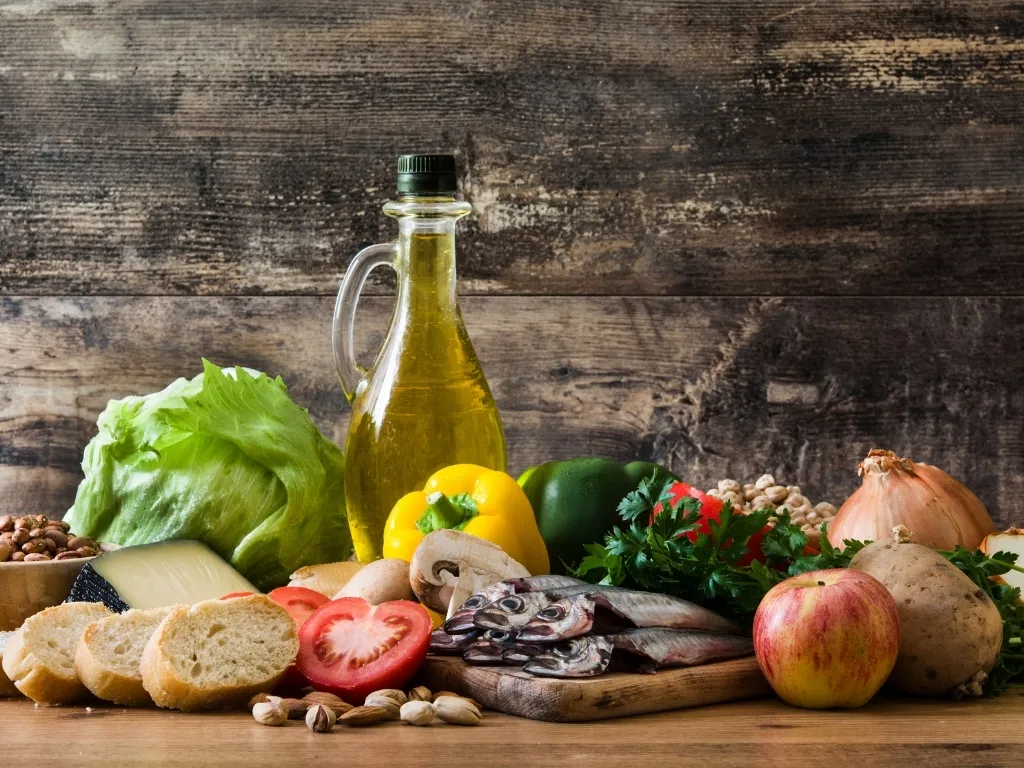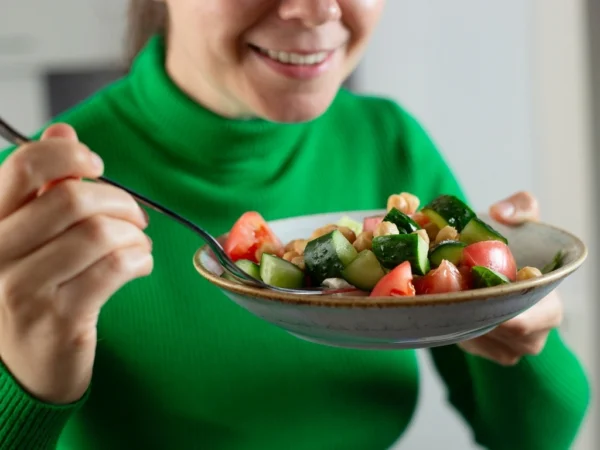Nutrition plays an integral role in supporting reproductive health. For many people trying to conceive, nourishing the body through healthy dietary changes can feel like a tangible, empowering step in a process that may feel beyond your control.
Research supports the idea that a balanced, nutrient-rich fertility diet may help create conditions that are more favorable for conception. However, it’s important to remember that no single diet choice can directly cause or cure infertility.
If you’re hoping to boost fertility through food, focusing on nutrient-dense options like whole grains, fruits, vegetables, healthy fats, and lean proteins can balance hormones, stabilize energy, and prepare your body for pregnancy in a gentle, sustainable way.

What does science say about fertility diets?
Current research suggests that certain eating patterns — particularly those focused on wholesome, nutrient-rich foods — may help improve the chances of conception. While these findings are promising, more evidence is needed to confirm them.
Among all the dietary patterns studied, the Mediterranean diet has received the most attention. This diet centers on plant-based foods and healthy fats — such as fruits, vegetables, olive oil, nuts, fish, and whole grains — all naturally rich in antioxidants, fiber, and nutrients that support hormone balance and overall health.
A 2024 review involving more than 2,000 women undergoing fertility treatments found that those who most closely followed a Mediterranean-style eating pattern tended to yield higher chances of pregnancy success. The review analyzed seven studies in total, some of which reported that women adhering to this diet were about 1.4 times more likely to conceive, while others even showed a 2- to 2.5-fold increase.
Earlier research backs up these findings. A study published years prior in 2018 looked into the same food groups common in the Mediterranean diet and found a 66% lower risk of ovulation-related infertility among women who observed this form of fertility diet. These women also experienced fewer fertility problems in general.
Across multiple studies, certain nutrients consistently emerged as important. For one, folate has been linked to higher pregnancy rates, with one study suggesting that women taking folic acid were more than twice as likely to become pregnant. Meanwhile, omega-3 may also promote better quality in both egg and embryo.
On the other hand, poor reproductive outcomes are often associated with diets high in trans fats and processed foods. Added sugars can also negatively affect insulin sensitivity and hormone regulation, particularly for individuals with polycystic ovary syndrome (PCOS), making it more difficult for them to conceive.
While the trend appears promising, with other reviews echoing that dietary choices lifted from the Mediterranean diet have the potential to improve reproductive health, it’s far from certain at this point.
Differences in how researchers define fertility diets and the types of fertility treatments studied may influence results. We stand to benefit from more rigorous, long-term trials to confirm whether these connections truly hold water.
For now, what we can confidently say is that a nutritionally balanced diet — supplemented by a mindful limitation of sugary drinks and processed snacks — brings benefits that make the body far more resilient and ready for the challenges that come with pregnancy.
While the Mediterranean diet provides a strong foundation, no single fertility diet can guarantee pregnancy. Prioritizing balanced, nutrient-dense meals helps your body perform optimally and fosters a healthy environment for conception.

6 foods that may improve fertility in women
What you eat can gently influence your reproductive health, so when trying to conceive, it’s essential to choose foods that support your hormone balance, egg production, and overall well-being.
If you’re looking to bring the Mediterranean diet’s nutrient-rich approach into your everyday routine, these are some of the best foods to eat to boost fertility, according to research.
1. Whole grains and fiber-rich carbohydrates
Whole grains and fiber help keep blood sugar and hormones in balance, which are two key factors for regular ovulation. Studies have found that women who eat more fiber and complex carbs tend to experience fewer ovulation-related fertility challenges than those who consume more refined carbs.
Instead of white bread and pastries, reach for brown rice, quinoa, oats, barley, and whole-grain pasta. Legumes like beans and lentils also add extra fiber and plant protein, which lend stable energy and promote hormone health.
2. Healthy fats
Healthy fats not only enable your body to absorb vitamins and reduce inflammation — they also form the building blocks for hormones, largely because of their omega-3 fatty acids.
Several studies have linked sources like olive oil, avocados, nuts, and seeds — all staples of the Mediterranean diet — with better egg quality and higher conception rates. One study even found that women who ate more monounsaturated fats (the kind found in olive oil and avocados, in particular) were about three times more likely to have a successful outcome during in vitro fertilization (IVF) than those who didn’t.
You can easily add healthy fats to your diet organically by simply drizzling olive oil on salads or meals, sprinkling nuts or seeds on yogurt, or enjoying a few slices of avocado on whole-grain toast.
3. Lean proteins
Protein enhances your body’s ability to build and repair tissues, including reproductive cells — but the type of protein you consume matters. Swapping animal protein for some plant-based options like beans, lentils, tofu, or nuts is encouraged, as it may be more supportive of healthy ovulation.
You don’t need to eliminate animal proteins from your fertility diet completely. For your regular intake, go for lean poultry, eggs, and oily fish such as salmon or sardines, which provide omega-3 fats that balance hormones and aid in embryo development. If you eat red meat, enjoy it occasionally, and choose lean cuts.
4. Antioxidant-rich fruits and vegetables
Fruits and vegetables are full of antioxidants, which are natural compounds that protect eggs (and sperm) from cellular damage caused by stress and pollution. Studies show that people who consume more fruits and vegetables tend to have better reproductive health and lower inflammation.
Aim to fill at least half your plate with colorful produce like berries, citrus fruits, leafy greens, tomatoes, carrots, and bell peppers. The more varied your colors are, the broader the range of nutrients you’ll get.
5. Dairy or calcium-rich alternatives
Calcium plays an important role in hormone function and egg development. Research suggests that full-fat dairy, such as whole milk or yogurt, may be a better addition to a fertility diet. This is because it may help reduce ovulation-related issues compared to primarily consuming low-fat products.
If you’re lactose-intolerant or prefer to avoid dairy, you can get calcium and vitamin D from alternatives like fortified plant milks, leafy greens, tofu made with calcium sulfate, or sesame seeds.
6. Iron- and folate-rich foods
Iron and folate are essential nutrients to focus on before and during pregnancy. Low iron levels can affect ovulation, while folate helps prevent early pregnancy complications and supports fetal development.
In a 2022 study probing the effects of diet on ovulation disorders, women who ate more plant-based sources of iron (like lentils, spinach, beans, and pumpkin seeds) and folate-rich foods (like leafy greens, citrus, and fortified grains) had a significantly lower risk of ovulatory infertility.
Most prenatal vitamins contain these nutrients, but getting them through food adds an extra layer of nourishment.
If any of these foods don’t seem as effective for you as they are for others, that’s perfectly fine. Your path to fertility and proper nutrition is very personal, and finding what nourishes your body best often takes time and professional guidance.

Here’s why talking to a Health Loft dietitian is a smart next step
Learning which foods may increase fertility in females is often straightforward, but the same can’t always be said about translating this knowledge into everyday meals that work for your body.
Reproductive health is shaped by many factors beyond nutrition, which is why your fertility diet should account for everything else: your hormones, stressors, medical history, current level of activity, and lifestyle in general.
Our registered dietitians specialize in women’s health and prenatal nutrition, offering personalized, evidence-based care designed to support you at every stage. They take the time to understand your full health picture, helping you identify nutrient gaps, manage conditions like PCOS or insulin resistance, and create a balanced plan that promotes both fertility and overall well-being.
We make medical care accessible by offering virtual telehealth sessions you can attend wherever you may be. Most of our providers are also in-network, so your appointments may come at little or no cost, depending on your insurance coverage.
Let nutrition be a key part of building the future you dream of. Connect with Health Loft today and learn how we can assist in your fertility journey.
This article was reviewed by Adrienne DePaul, MS, RDN. It is intended for informational purposes only and does not replace personalized nutritional advice.













